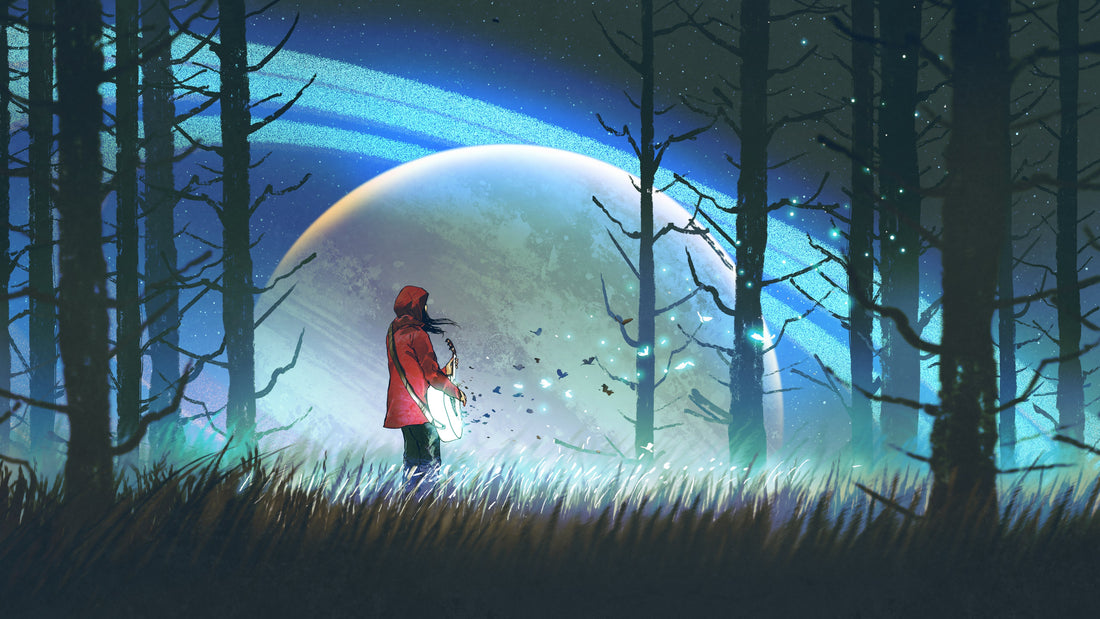
The secret of music in worldbuilding
You know when you sit down to write, and you put on your favorite song or white noise, and everything just flows? Or, at least, it feels like it could?
That’s because music is an essential part of being human (or humanoid, for those of you squid-folk and were-pigs out there). Today at Scribe Forge, we’re talking about music and the role it plays in your fictional world.
Let’s start with the individual level. What is your character’s relationship with music? Did they grow up dreaming of being a rock star? Are they a fearsome warrior who listens to your world’s equivalent of jock jams to get pumped up before a battle (as real life athletes do)? Does your monk or scribe or evil genius decompress by listening to a soothing songstress like Enya? (Let’s just assume Enya exists across all dimensions and your wizened wizard is chilling to Sail Away).
Think about how music features into your real life. Use that to inform your characters’ relation to music. You can apply this as a simple background detail to enrich your story, like how in Good Omens, any cassette left in Crowley’s Bently turns into a Queen album. Or you could have a music-obsessed character meet another music-obsessed character, and have that be the basis of a deadly love story, a la Gaston Leroux’s The Phantom of the Opera. Maybe your characters can meet at a concert or at choir practice.
In the Tavicat graphic novel, Sushi Girl, the MC performs “hip hopera” as her main ambition. Okay, so she still needs to get a food delivery job on the side, but this is set in a world where karma is literally currency. The point is, music was the how and why for the protagonist to set out for the big city and meet the other characters. The MC’s personal relationship to music sparked the turning point of the story.
Now let’s take a step back and look at the world level. Music is part of so many things: community, artistic expression, and industry. Ask yourself how music fits into your world.
Who makes music? Is it considered a job like any other or a higher calling? How are musicians viewed by society—including the different rungs of society? Is music available to everyone freely or is it regulated and controlled? By whom and for what reason? Music is often a marker of personal identity as well as cultural group. How does music differ between the different cultures in your world?
Where and how is music played? Is it only live like in the days before recording equipment? Or is it never live like in the days of a worldwide pandemic? What are considered acceptable topics to sing about? What is considered taboo but sung about anyway? For example, the WAP controversy in our world. All of this should tie into your world’s values and ethics (learn how to figure out your fictional world’s values with The Essential Worldbuilding Blueprint and Workbook).
If your MC dreams of being a famous musician, how viable is that for a career option in your world? Maybe it’s considered as respectable as law school and as attainable as a Starbucks gig. Although, if that’s the case, does being your world’s equivalent of a rockstar have the same appeal? How does your character, and their relation to music, fit into your larger world? Or work it backwards; what role does music play in your larger world, and how does that affect your character?
Remember that music is not just one thing. Just like how punk and classical have different connotations in our world, ask yourself if there are different genres, instruments, and styles carrying specific meanings in your world.
Keep in mind that the same meaning can have different associations. For example, in F. Scott Fitzgerald’s The Great Gatsby, that newfangled jazz music was reckless and chaotic - something to look down upon and maybe get drunk to before you go to a raging party. Whereas in Tony Morrison’s Jazz, the titular music was… okay, well, it was still wild and chaotic, but it symbolized the promise of change coming to an unfair society.
So go ahead and add some music into your worldbuilding. Just remember, if you’re creating in a non-auditory medium, music will be a detail or plot point more than it will be part of a setting. That is, if your audience is reading your story rather than listening to it, music unfortunately can’t set the scene alone.
You can, however, have two characters meet at a concert or use music as a marker of cultural identity. After all, music isn’t just something you listen to. It’s a part of who you are. Now go put your headphones on and write some words.
If you're stuck with your worldbuilding, check out The Essential Worldbuilding Blueprint and Workbook.